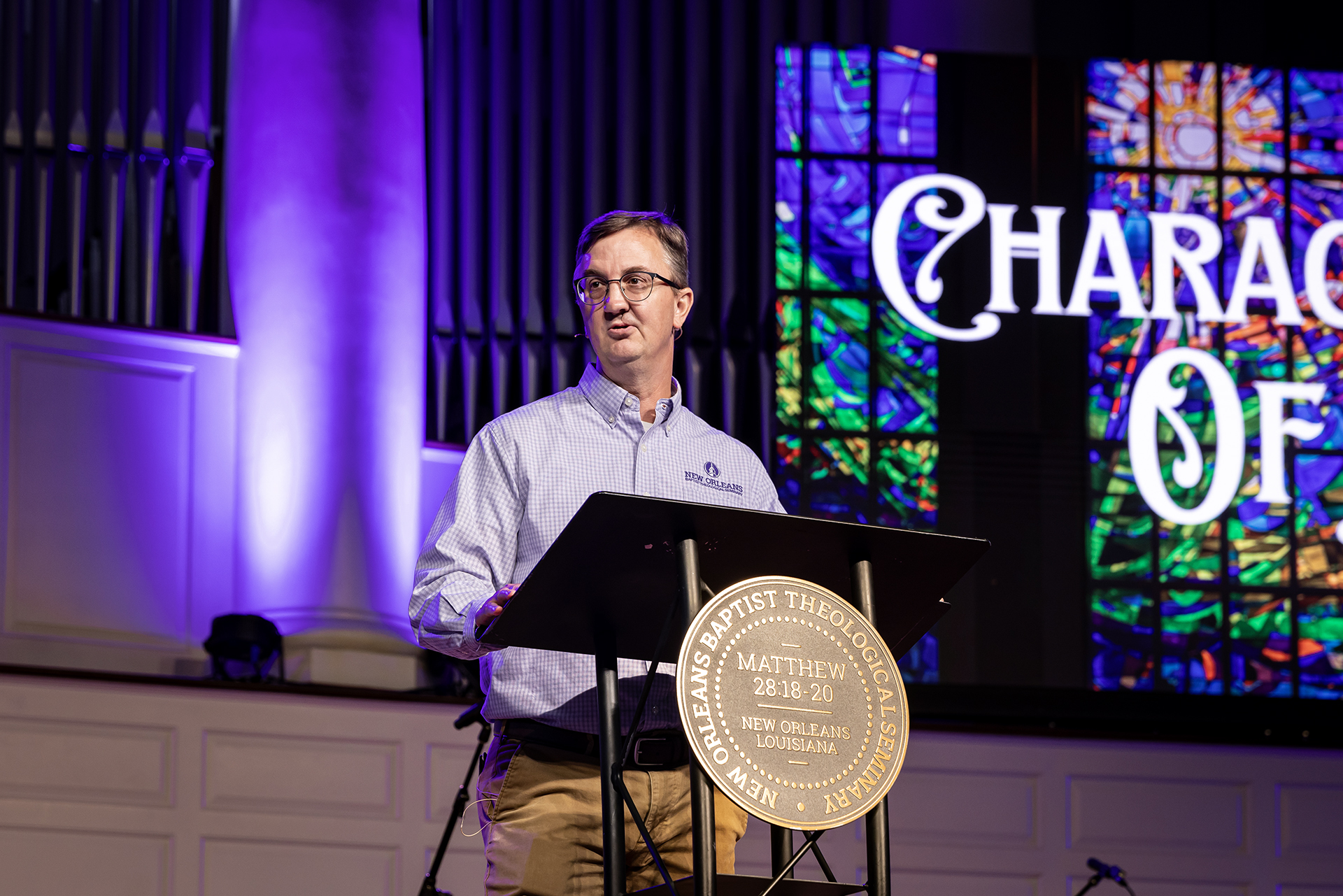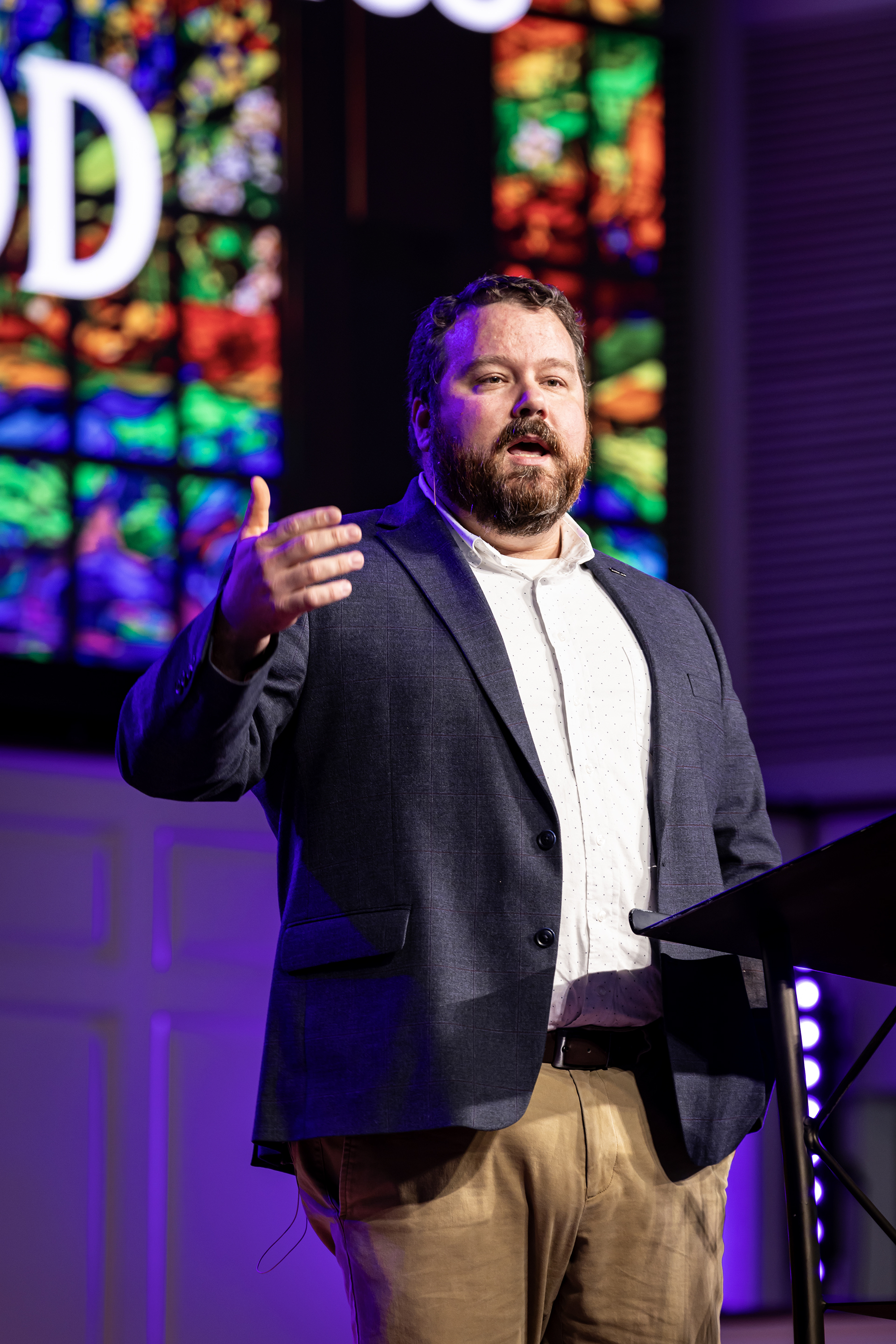
This semester’s NOBTS chapel series on the attributes of God kicked off last week with faculty members Cory Barnes and Norris Grubbs preaching on God’s wrath and God’s grace.
Barnes, dean of graduate studies and associate professor of Old Testament and Hebrew, began the series on Tuesday, Aug. 27, by speaking on the subject of God’s wrath.
Reading from John 3, Barnes spoke about why understanding the wrath of God matters both in the passage and for believers in a general sense.
He explained God’s wrath, mentioned nearly 200 times in the Bible, is an important topic to discuss despite some people either being uncomfortable with it or overemphasizing it.
“God’s wrath is an important theme in the Bible, and the Bible is clear on it,” Barnes said. “It’s not a topic to be avoided. The Bible says this is central to understanding who God is.
“Let’s also confess this: we could focus on the wrath of God for the wrong reasons. There is sometimes a tendency for believers to really want to focus on the wrath of God, and I think at times they kind of have this attitude that ‘I’m a jerk and I want God to be too.’ Wrong reason to focus on the wrath of God.”
“While God’s wrath is Holy and just, wrath in us is inherently sinful.”
Barnes went on to explain how God can be wrathful towards people.
“God is wrathful because He is righteous and we are sinful,” Barnes said. “God’s wrath to us is His default position due to our wickedness. This is not just God reacting to our behavior. This is God who is eternally Holy, just and unchanging, so His disposition to those of us in sin is that we receive His is wrath.”
 Barnes closed by emphasizing the amazing grace and love of God despite humanity’s sin against Him.
Barnes closed by emphasizing the amazing grace and love of God despite humanity’s sin against Him.
“Jesus came into a world in which all of us in our sins are under the wrath of God," he said. "All of us, because of who God is, are sinners, and Jesus has said I will bear the wrath.”
Barnes’ full message can be viewed here.
Grubbs, provost and professor of New Testament and Greek, continued the series by contrasting Barnes’ message on God’s wrath with a message about God’s grace.
He began by explaining that grace is both an activity of God and a characteristic of who He is.
“In one sense, grace is a characteristic of God, but in many ways it’s an activity,” Grubbs said in his message on Thursday, Aug. 29.
“He is a gracious God. A God who shows grace. This is a key theological theme throughout the Bible. We see God’s grace toward Israel in the Old Testament over and over, and then we see His climactic act of grace through Jesus on the cross in the New Testament.
“As we think about these characteristics of God, it would be easy to separate grace from the other characteristics. We shouldn’t think that sometimes God acts out of grace and other times He acts out of wrath.
“These characteristics that we’re talking about in terms of God, they describe who He is. He is gracious and loving, and He is Holy and righteous and just. When we encounter Him, we don’t just encounter the grace of God, we encounter God, who is gracious and loving. I think it’s totally appropriate that today we think about God as a gracious God because this is what God says about Himself.”
Speaking out of Ephesians 2:1-10, Grubbs said there are two ways to think how God’s grace: grace that saves and grace for the saved.
“There is grace that saves. And there is grace for the saved,” he said. “God’s grace enables us to do ministry, sustains us in difficult times, enables us to resist temptation, and instructs us in righteousness. He’s not just gracious in salvation, He is always gracious.”
Grubbs closed by reminding students there is always room to grow in their knowledge of grace.
“No matter where you are in your walk with Christ, there is room for you to grow in your understanding of God’s grace,” Grubbs said. “There is room for you to grow in your knowledge about who Jesus is and what He’s done for you. We are commanded to grow in that.”
Grubbs’ full message can be viewed here.
NOBTS chapel is held every Tuesday and Thursday at 11 a.m. CST. It can be watched live on Facebook and YouTube. A full schedule of the semester’s chapel speakers is available here.